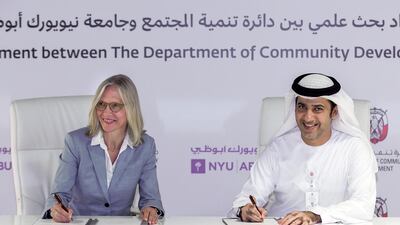Abu Dhabi has commissioned NYU Abu Dhabi to research innovative ways to tackle social issues such as personal debt defaults, enhancing child care services, increasing physical activity among residents and promoting family cohesion.
The emirate's Department of Community Development signed an agreement with the university on Wednesday to study and design ‘nudges’ to tackle social issues facing the emirate’s residents.
Nudge theory was named and popularised by the 2008 book, Nudge: Improving Decisions About Health, Wealth and Happiness, written by American academics Richard Thaler and Cass Sunstein.
Nudges are often small and cost-effective interventions that aim to change people’s behaviour while not drastically restricting their choices. The use of automatic opt-ins, for example, to increase employee savings for retirement is perhaps one of the best known nudges in Western economies.
In recent years, governments and institutions around the world have increasingly applied behavioural economics to support public policy. At least 202 entities worldwide use nudge theory as of 2018, according to the Organisation for Economic Co-operation and Development.
The issues that NYUAD’s research will address come out of a survey conducted by the Department of Community Development in 2018 of more than 51,000 people living in the capital, of whom 60 per cent were non-Emiratis.
The efforts by the department to listen and respond to resident feedback falls under the Ghadan 21 stimulus programme launched by Sheikh Mohamed bin Zayed, Crown Prince of Abu Dhabi and Deputy Supreme Commander of the Armed Forces. The Dh50 billion three-year programme is driving the emirate’s development through investments in business, innovation and people to improve the quality of life for every resident.
Wednesday's research agreement was signed by Hamad Al Dhaheri, acting undersecretary of the Department of Community Development, and vice chancellor of NYU Abu Dhabi Marïet Westermann.
“We seek through this agreement to benefit scientifically from NYU Abu Dhabi,” Mr Al Dhaheri said. “The research will apply the ‘nudge’ theory to government work in a way that positively influences the behaviour of individuals, supporting the department's vision that aims at providing a decent life to all members of society.”
Mr Al Dhaheri added that the nudge theory is closely connected to the innovation ecosystem Abu Dhabi is aiming to foster, because it draws on psychology, politics and behavioural economics to develop low-cost solutions that will positively influence the actions and choices of residents.
Nudges will be achieved by making minor changes to the way information is presented. The theory, he added, could also contribute to drawing individuals' attention to the best courses of action that would influence their behaviours to “lead a better life”.
The research will be conducted by a half dozen behavioural economists at the university who will identify priorities and design nudges to be simple and cost-effective.
They will work in collaboration with the Department of Community Development to experiment and confirm predicted behaviours and test the success rate of the nudges they develop. After evaluations, the team will make formal policy recommendations to implement on a wider scale.
"In line with the mission of the Department of Community Development, we believe in the importance of building active, tolerant and inclusive communities, and to ensure broad participation of the many and diverse people who call Abu Dhabi home,” Ms Westermann said. “This agreement provides new pathways for us to increase our research collaborations between the department and our university.”


